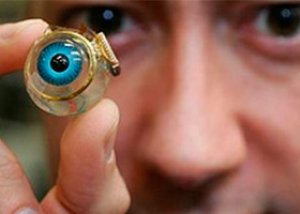
All iLive content is medically reviewed or fact checked to ensure as much factual accuracy as possible.
We have strict sourcing guidelines and only link to reputable media sites, academic research institutions and, whenever possible, medically peer reviewed studies. Note that the numbers in parentheses ([1], [2], etc.) are clickable links to these studies.
If you feel that any of our content is inaccurate, out-of-date, or otherwise questionable, please select it and press Ctrl + Enter.
New generation molecular retinal prostheses have been tested
Last reviewed: 02.07.2025
 ">
">Scientists from Catalonia have completed a long-term work on the creation of light-sensitive molecules for use in molecular retinal prosthetics. The specificity of the technology is that today it is possible to restore lost visual function in patients with retinal degeneration. The study was led by doctors Pau Gorostiza and Amadeu Llebaria, representing the University of Chemical Research of Catalonia.
Scientists point out that when molecules are connected to nerve cells, a complete restoration of the reaction to light stimuli occurs. In collaboration with specialized higher education institutions in Spain, professors conducted tests on cellular structures of a new type of therapeutic molecules. We are talking about the so-called targeted covalent light switches, capable of transforming their structure under the influence of light. Targeted light switches are a relatively new product obtained by specialists in the chemical field at the Catalan University of Biological Engineering. This invention was initially proposed for use in remote management and correction of various implants. As the scientists explained, they tried to coordinate the functionality of devices and apparatuses implanted in tissues using a light stimulus. However, after additional experiments and studies, it was found that the connection of targeted covalent light switches and protein structures of neurons leads to the restoration of the natural reaction to natural light.
Thus, the new product is theoretically capable of replacing light-sensitive structures lost due to degeneration processes in the retina. "In a natural environment and under adequate conditions, light-sensitive eye structures - photoreceptors - are stimulated and become active under the influence of rays, sending urges to other cells. The molecular implants we have invented are also activated by light radiation. They are capable of transforming the configuration of molecules, interacting with the Nervus opticus - the second pair of cranial nerves, through which the picture in the form of a visual image received by sensory cells in the retina is transmitted to the brain," explains the author of the study. The new generation of molecular retinal prostheses have already been successfully tested on the visual organs of blind rodents: specialists have managed to record a pronounced reaction of the rodents to a light stimulus. In vitro tests prove that it is quite possible to restore visual function in humans if vision loss is associated with degenerative changes in the retina. Almost everything is ready for the first experiments. However, as scientists point out, it may take another couple of years to conduct laboratory experiments and clinical tests.

 [
[